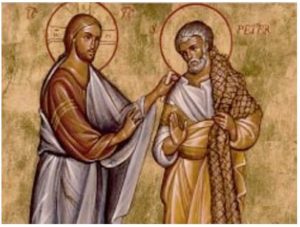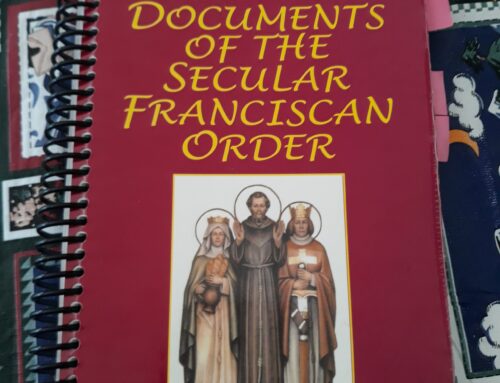 In the Gospel of John, this story appears after the Resurrection and seems very warm and intimate, on the one hand; but on the other, not really necessary. I mean, Jesus has already risen from the dead. He has appeared twice to his disciples after the Resurrection. “This was now the third time Jesus was revealed to his disciples after being raised from the dead” (John 21:14). What is left to teach the disciples? They now understand, don’t they, that Jesus is the Messiah and that He has come to earth to save us from sin and death by suffering and dying Himself on the Cross and then rising on the third day? He has done all of that. They have seen it, but more is apparently needed
In the Gospel of John, this story appears after the Resurrection and seems very warm and intimate, on the one hand; but on the other, not really necessary. I mean, Jesus has already risen from the dead. He has appeared twice to his disciples after the Resurrection. “This was now the third time Jesus was revealed to his disciples after being raised from the dead” (John 21:14). What is left to teach the disciples? They now understand, don’t they, that Jesus is the Messiah and that He has come to earth to save us from sin and death by suffering and dying Himself on the Cross and then rising on the third day? He has done all of that. They have seen it, but more is apparently needed
“When they had finished breakfast, Jesus said to Simon Peter, ‘Simon, son of John, do you love me more than these?’ He said to him, ‘Yes, Lord, you know that I love you.’ He said to him, ‘Feed my lambs.’ He then said to him a second time, ‘Simon, son of John, do you love me?’ He said to him, ‘Yes, Lord, you know that I love you.’ He said to him, ‘Tend my sheep.’ He said to him the third time, ‘Simon, son of John, do you love me?’ Peter was distressed that he had said to him a third time, ‘Do you love me?’ and he said to him, ‘Lord, you know everything; you know that I love you.’ [Jesus] said to him, ‘Feed my sheep’ ” (John 21:15-17).
Okay, you’re right: With the Lord, there are no wasted moments; and in John’s Gospel, as in each of the Gospels, there are no passages that should be overlooked as seemingly unnecessary. For example, why were some of the disciples returning to a previous occupation of fishing for fish when the Lord had already called them to be “fishers of men”? (Mark 1:17). Had they lost faith? Did they think they needed to return to business as usual?
And what is the Lord trying to teach Peter, the first “minister” of the first “fraternity” of the first “observers” of “the gospel of our Lord Jesus Christ”? (Secular Franciscan Order Rule 4, http://www.nafra-sfo.org/sforule.html). As I look back as your elected minister on our National fraternity in 2011 and look forward to 2012, this Gospel suggests four lessons that I have learned and would like to share with you.
One, the Lord wants us to follow Him by keeping his commandments and remaining in His love (see John 15:9, 10; see Secular Franciscan Order Rule Prologue, Chapter 1), but, two, even if we fail badly and deny the Lord three times, lying that we don’t even know Him, the Lord will not fail us or stop loving us; rather, He will give us ample opportunity to redeem ourselves, to turn from sin and be converted to Gospel living. “Human frailty makes it necessary that this conversion be carried out daily” (Secular Franciscan Order Rule 7).
What is implicit in these first two lessons is the explicit third lesson. How do we keep the Lord’s commandments and remain in the Lord’s love? By our love. How do we often fail to respond to the Lord’s unfailing, unconditional love? By not loving enough. Why else would Jesus ask Peter three times, “Do you love me?” After a threefold denial of Him before His Crucifixion, the Lord expects a threefold Confession of love for Him from the first “minister” of the first “fraternity” of the first “observers” of “the gospel of our Lord Jesus Christ.”
After all, at the heart of the Old Testament Torah, the first five books of the Bible, is the great Shema, “Hear, O Israel” (Deuteronomy 6:4); and at the heart of the great Shema is love: “you shall love the LORD, your God, with your whole heart, and with your whole being, and with your whole strength” (Deuteronomy 6:5).
Similarly, when tested by the scribes about what is the first of all the Commandments, Jesus answers, “You shall love the Lord your God with all your heart, with all your soul, with all your mind, and with all your strength. The second is this: ‘You shall love your neighbor as yourself.’ There is no other commandment greater than these” (Mark 12:30-31).
Thus, love is the third great lesson of this Gospel story; love is the answer to the Lord’s expectations of us in lesson one and how we should respond to the Lord’s love in lesson two. Lesson four is how we should manifest our love. “Feed my lambs.” “Tend my sheep.” “Feed my sheep.” (John 21:15-16).
How does one show love to the Lord? By the care and feeding of the Lord’s flock. The one “assignment” that Our Lord gives to Peter, the leader of his initial fraternity of disciples, once Peter satisfactorily answers the question, “Simon, son of John, do you love me?” is to care for and feed the Lord’s flock (John 21:15-17). Note, please, love of the Lord comes first, and then necessarily follows the care and feeding of the Lord’s flock.
Finally, how do we manifest that care and feeding of the Lord’s flocks? By taking care of our fraternities. Thus, I wrote in my 2011 Annual Report and spoke in my 2012 vision of our Order: “Perhaps no aspect of the Secular Franciscan life should be of more concern to those called to leadership than the vitality of the fraternity, be it local, regional, national or international” (http://www.nafra-sfo.org/meetings_and_resources.html).
So how do all of us called to leadership, called to the training and nurturing of leaders, provide for the vitality of our fraternities?
Article 92.1 of the General Constitutions of the Secular Franciscan Order states: “The purpose of both the pastoral and fraternal visits is to revive the evangelical Franciscan spirit, to assure fidelity to the charism and to the Rule, to offer help to fraternity life, to reinforce the bond of the unity of the Order, and to promote its most effective insertion into the Franciscan family and the Church.”
These are the Constitutionally mandated “life signs,” the specific “signs of vitality” that International Visitors must check when they visit National, what National Visitors must check when they visit Regional, what Regional Visitors must check when they visit Local, what Local Visitors must check when they visit a new or emerging group. These are the measures of how we all should be caring for and feeding our fraternities.
I have written in this publication about the four “signs of vitality” for every single Franciscan Gathering, whether an Annual Chapter or an “ordinary meeting”: “Prayer, Formation, Fraternal Sharing and Necessary Business, and in this order!”(TAU-USA Winter 2010 Issue 69, http://www.nafra-sfo.org/tau-usa/articles/winter10/minister_winter10.pdf).
We need time to pray, to reform ourselves and our fraternities, to know and love each other better and to conduct whatever necessary business we have to do. Perhaps the key word here is time: it takes time to build and be a Franciscan family at any level. Please, leaders, allow enough time to ensure the vitality of your fraternity. We at National met from Tuesday, October 25 to Sunday, October 30, 2011. We plan to gather the entire National membership at our Quinquenniel from Tuesday, July 3 to Sunday, July 8, 2012.
Did your Regional or local fraternity gather even once in 2011 for an entire weekend, from Friday evening to Sunday morning? Do you plan to do so in 2012? How can you build the vitality of your fraternity on a few hours a month? Is this what you would expect from your own family? Often, I fear we sacrifice the vitality of our fraternity life to save time and money.
I followed up this past year with an article entitled “The Primary Focus and the Four Marks of a Vibrant Secular Franciscan Fraternity” (TAU-USA Spring 2011 Issue 70, http://www.nafra-sfo.org/tau-usa/articles/spring11/minister_spring11.pdf). In this article, I stated that: “Spirituality, Formation, Family and Witnessing all for the sake of ‘the salvation of souls’ (Canon 1752, Code of Canon Law http://www.vatican.va/archive/ENG1104/__P70.HTM) offer us the Primary Focus and Four Marks of a vibrant Secular Franciscan Fraternity. These were precisely the reason why prayer, formation, fraternal sharing and only as much business as is necessary offer us the four purposes of a fraternal gathering, and I prayed in the article and every day that God will “give us the grace, the Living Presence of Christ and the Fellowship (now Communion) of the Holy Spirit when we gather to worship, to form, to share, to witness in Christ’s Name, always striving to keep our fraternities and our souls alive and focused on salvation.”
As Spirituality is the initial and essential element of fraternity, then that Spirituality and love of the Lord must be witnessed out in the world, not put under the bushel basket of the fraternity gathering. Therefore, in the same article I wrote, “We are to be a ‘community of love’ (Secular Franciscan Order Rule 22) to all in the world. As Saint Pope John Paul II told us directly at the Xth General Chapter in 2002: ‘The church expects from you, Secular Franciscans, a courageous and consistent testimony of Christian and Franciscan life, leaning towards the construction of a more fraternal and gospel world for the realization of the Kingdom of God’.”
These aspects of vital fraternal living were the focus of our National Meeting in October 2011 in California. We prayed and celebrated the Holy Sacrifice of the Mass together; we formed together; we shared, ate, laughed and learned together; we did what business was ours to do together. These aspects of vital fraternal living will be our focus for our 2012 Quinquennial Gathering of all the Nation.
I urge YOU, yes, YOU, one from every fraternity in the United States, to make every effort to join your wonderful Order’s International, National, Regional and Local leadership at the 2012 Quinquennial to be held at the Holiday Inn Chicago North Shore Skokie Hotel (http://www.nafra-sfo.org/q2012.html). We have secured this hotel for only $87 a night (if you order before June 9), with free shuttle service to and from Chicago’s O’Hare Airport, based on scheduled routes. We will start with 5:00 Dinner and 7:30 Opening Liturgy with Bishop George J. Rassas, Auxiliary Bishop, Archdiocese of Chicago on July 3, enjoy a wonderful July 4 Picnic and Fireworks Display, and depart after Breakfast, Morning Prayer and Closing Remarks on Sunday, July 8, 2012 all for only $275, all meals included, if you register before June 1. This happens only once every five years, and we will focus on building the vitality of our fraternities at every level.
Our keynote speaker and major presenter will be Sister Ilia Delio, OSF, a renowned author on Franciscan Spirituality, with well-received books on St. Clare, St. Bonaventure, the Humility of God, the Emergent Christ and Franciscan Prayer. The theme for our Congress is Why Francis? Claim the Gift.
Other presenters include noted speaker, author and Professor at the Berkeley Theological Union, Friar William Short, OFM and two of our own Secular Franciscans: Patricia Brandwein-Ball, OFS, a former Regional Minister and National Councilor; and Edward Shirley, OFS, Professor and Theologian at St. Edward University in Texas and National Ecumenical Chair.
Please come and introduce yourself to me as we continue this discussion on the care and feeding of our fraternities at every level. I would be honored to meet and talk to you. If you cannot be with us, your personal prayer and holy life contribute greatly to the care and feeding of all our Franciscan flock.
Peace, with love and prayers,
Tom
Reflection Questions
- What is one lesson that the Lord teaches me through Peter in the Post-Resurrection Gospel from John?
- And even if I fail that first lesson, what is the second lesson that the Lord teaches me through Peter in the Post-Resurrection Gospel from John?
- Closely related to the first two lessons, what is the explicit third lesson that the Lord teaches me through Peter in the Post-Resurrection Gospel from John?
- What is the fourth lesson that the Lord teaches me through Peter in the Post-Resurrection Gospel from John? How might this lesson be applied by Secular Franciscan Servant Leadership?
- For review, what are the four “signs of vitality” for every single Franciscan Gathering, whether an Annual Chapter or an “ordinary meeting”? Do you agree or would you change the four signs, adding to or subtracting from?
- Again for review, what are the primary focus and the four marks of a vibrant Secular Franciscan fraternity? Do you agree or would you somehow shift the primary focus and/or add to or subtract from the four marks?
- How might each of us better fulfill Saint John Paul II’s expectation of “a courageous and consistent testimony of Christian and Franciscan life, leaning towards the construction of a more fraternal and gospel world for the realization of the Kingdom of God”?
This is an excerpt from a series of articles by the late Deacon Tom Bello, OFS, former Minister of the National Secular Franciscan Order – USA. “Many of these essays were originally published in TAU-USA, our national newsletter,” said Jan Parker, OFS, current National Minister. “They are excellent for reflection and ongoing formation.” Jan helped Tom publish these essays in book form. It is called For All The Saints: St. Francis’s Five-Point Plan for Salvation and is available from Tau Publishing. These excerpts will appear several times a week on the Secular Franciscans website.



Leave A Comment